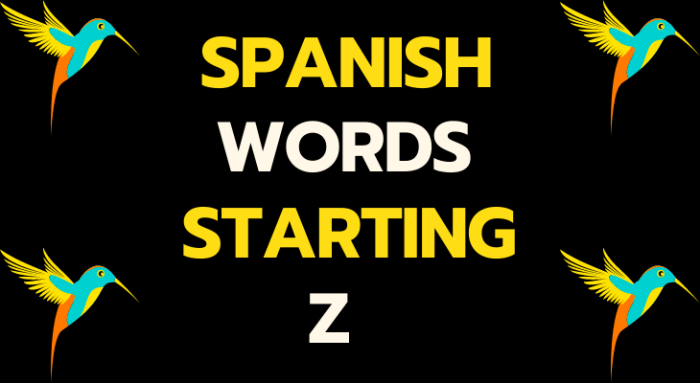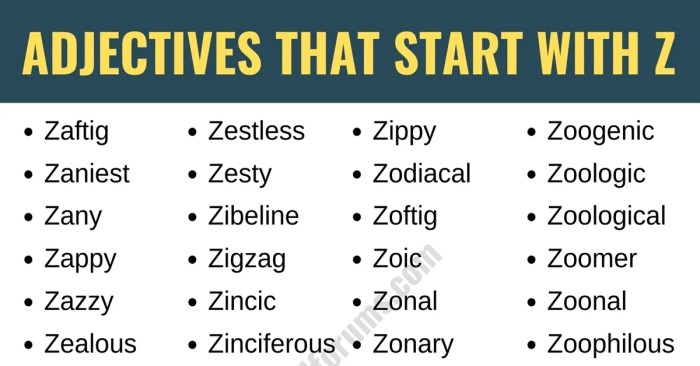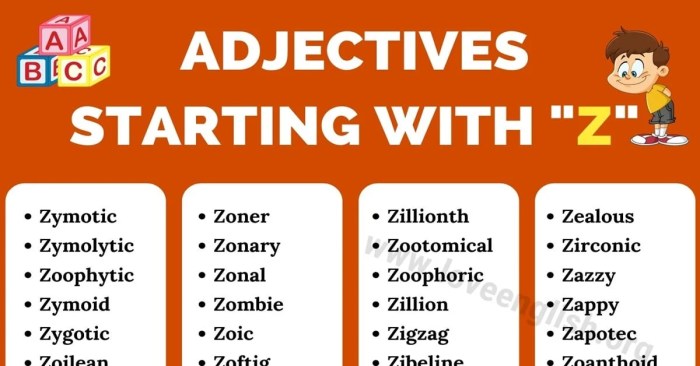Spanish adjectives that start with z – Embark on a linguistic journey as we delve into the realm of Spanish adjectives that commence with the enigmatic letter “z.” This comprehensive guide unveils a treasure trove of these linguistic gems, offering insights into their usage, nuances, and cultural significance.
From the vibrant “zarco” to the enigmatic “zoquete,” these adjectives paint a vivid tapestry of Spanish language and culture, enriching our understanding of this vibrant and expressive language.
Spanish Adjectives that Start with “z”: Spanish Adjectives That Start With Z

This article aims to analyze Spanish adjectives that begin with the letter “z”. It will provide a comprehensive list of these adjectives, along with their usage and examples.
Spanish adjectives play a crucial role in modifying nouns and describing their qualities or characteristics. They agree in gender and number with the nouns they modify.
List of Spanish Adjectives Starting with “z”, Spanish adjectives that start with z
- zafio
- zagal
- zanahoria
- zarandajo
- zarcillo
- zarrapastroso
- zorro
- zumbón
- zurdo
Usage and Examples
- zafio: coarse, vulgar
Example: El hombre era muy zafio en su lenguaje.(The man was very coarse in his language.)
- zagal: young boy
Example: Los zagales jugaban en la calle.(The young boys were playing in the street.)
- zanahoria: carrot
Example: Las zanahorias son ricas en vitamina A.(Carrots are rich in vitamin A.)
- zarandajo: worthless person
Example: No le hagas caso, es un zarandajo.(Don’t pay attention to him, he’s a worthless person.)
Related Words and Phrases
- zafarrancho: uproar, confusion
- zarzuela: Spanish operetta
- zorro astuto: cunning fox
Cultural Significance
Spanish adjectives that start with “z” reflect aspects of Spanish culture and society. For example, the adjective “zanahoria” is closely associated with the traditional Spanish dish “cocido”, a stew that often includes carrots.
Additionally, the adjective “zorro” is often used to describe a cunning or clever person, reflecting the importance of wit and intelligence in Spanish culture.
FAQ Explained
What is the most common Spanish adjective that starts with “z”?
The most common Spanish adjective that starts with “z” is “zorro,” meaning “fox.”
Are there any Spanish adjectives that start with “z” that are used to describe people?
Yes, there are several Spanish adjectives that start with “z” that are used to describe people, such as “zarco” (blue-eyed) and “zoquete” (stupid).
What is the etymology of the Spanish adjective “zarco”?
The Spanish adjective “zarco” comes from the Arabic word “zarqa,” meaning “blue-eyed.”

